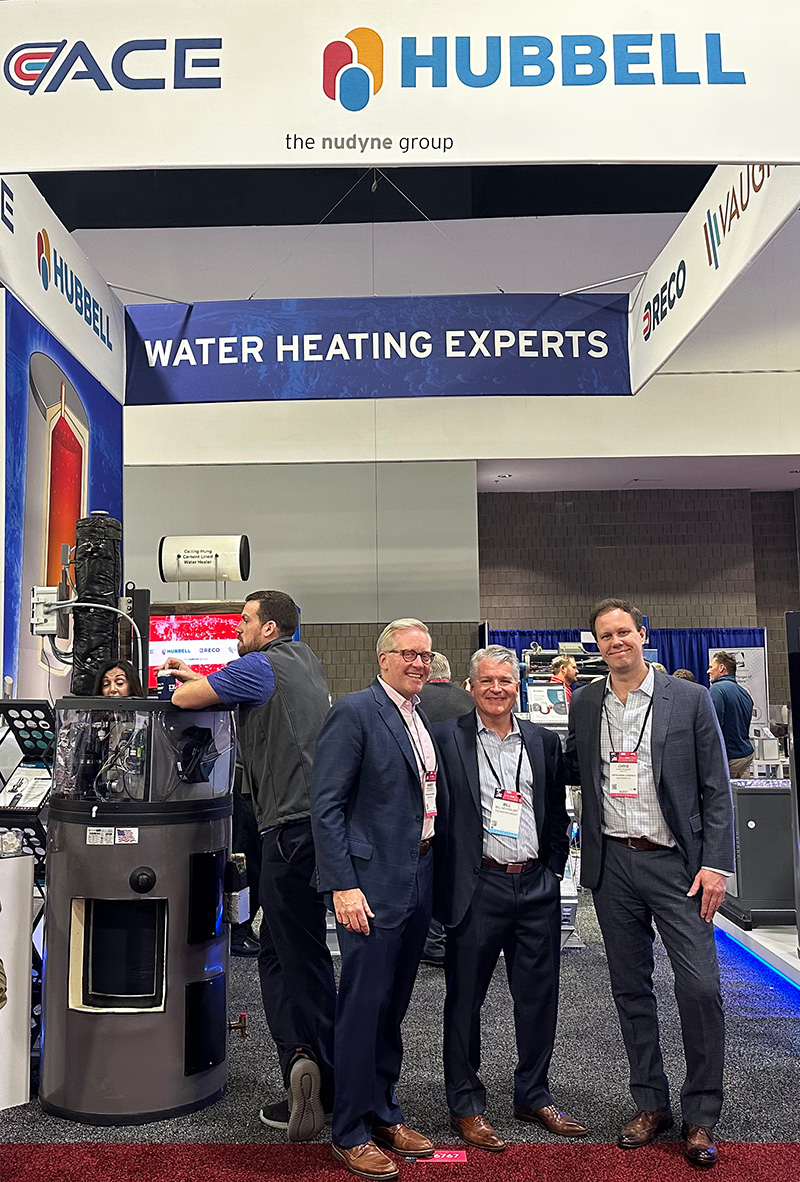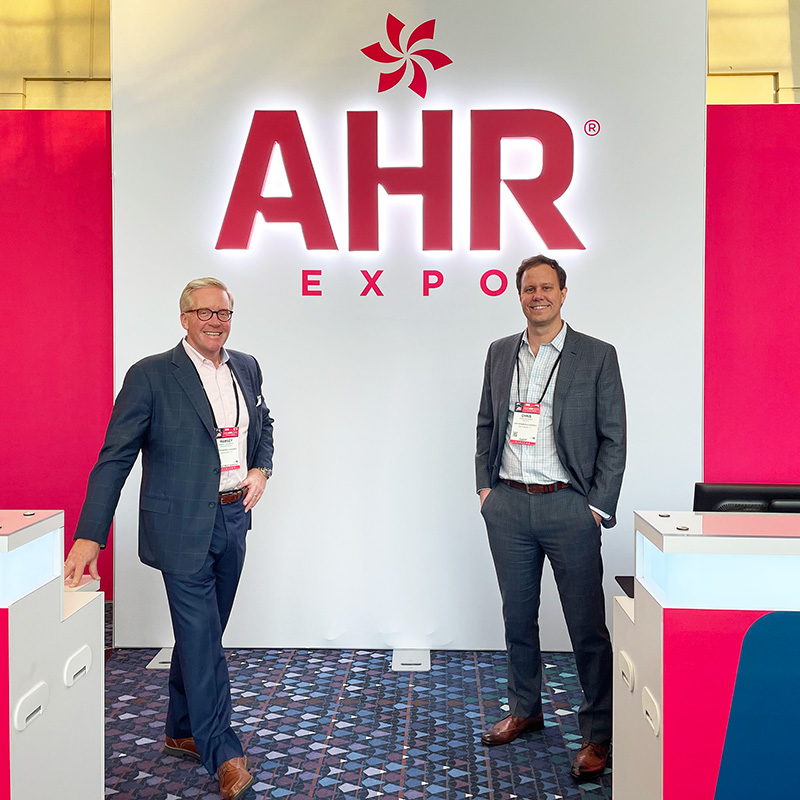Carter Morse & Goodrich made our annual trip to the AHR (Air-conditioning, Heating & Refrigeration) Expo in Atlanta a few weeks ago to see the latest trends in HVAC and meet with executives, thought leaders and business owners at the forefront of the industry. As one of the preeminent trade shows for the HVAC industry, the 2023 AHR Expo hosted nearly 1,800 exhibitors and 50,000 visitors over three days. For CMG, AHR Expo is an excellent opportunity to connect with past and future family-held and founder-led businesses, talk with leaders in the industry and gain valuable insights into the challenges and opportunities facing the HVAC industry in the year ahead.
This year, we came away with five key themes currently shaping the HVAC industry:
1. Product innovation drives the need for more training
The HVAC industry continues driving towards a cleaner future with new regulations that became effective in January 2023. With that in mind, new product innovation has driven the need for equipment manufacturers and their trusted distributors to focus more on education and training opportunities for contractors who will ultimately install, upgrade and service these new environmentally friendly systems. Education for end market HVAC contractors has become a key differentiator and those that do it well are separating from the pack and are driving real value resulting in higher sales volume, stronger relationships with both suppliers and customers and incremental value when it comes to M&A.
2. Combatting the supply chain “Perfect Storm”
Global supply chains continue to feel the impact of resource, equipment and labor shortages throughout the HVAC industry. With a global supply chain refined to be both lean and efficient, the pandemic provided a “perfect storm” of events that was defined by huge pricing shocks, dramatic shortages and much longer lead times. As a result, operators converted the well-established “just in time” sourcing model to a new “just in case” approach, where companies stockpiled inventory, leading to more volatility and instability. Our research implies that inventory levels are beginning to moderate from all-time highs in mid-2022, but that the overall supply chain may continue to be challenged well into 2023 and possibly beyond. We expect businesses that can successfully mitigate supply chain disruptions will certainly outperform their peers who are slower to react.

3. Inflation remains elevated, but so is confidence
Inflation and fear of recession have been two key concerns gripping the entire economy, and the HVAC industry has not been immune. Rising prices for materials and components, increases in labor costs and an uncertain supply chain have put real pressure on both margins and profitability. A key consideration for owners is their ability to pass on these costs to customers. It is expected that equipment costs will remain high (or retreat slowly) but that general supplies and accessory prices will retreat quickly to a more normalized level. Overall, it seems that most have been successful in raising prices to cover increased costs. However, it also depends on the end-market and the demand dynamics of the customer base.
Addressing the implications of a wider economic recession on the industry, the overall outlook and mood from AHR Expo attendees was upbeat. Most companies remain optimistic, driven by rising demand for energy-efficient systems, increased adoption of smart home technology, and growing concern about climate change and the need for cleaner energy.
4. Labor shortage & diversity
The skilled labor shortage was another key theme at AHR Expo 2023. With an aging workforce, the HVAC industry desperately needs to appeal to a younger and more diverse population. Experts on the keynote “State of the Industry” panel highlighted asymmetries in the HVAC labor force, citing how women currently account for only 3% of the industry, versus the wider US economy of 47%. They also noted that the HVAC labor pool continues to shrink despite end-market demand rising. We have heard, especially from service companies, that business revenue could be 20-30% higher (or more!) if they could only find skilled labor. On a positive note, as HVAC education and certification classes have successfully migrated online, training has become more convenient and accessible for aspiring tradespeople. Independent business owners with strong training programs can more nimbly compete for workers in a competitive environment while also driving growth in their businesses.
5. M&A is growing in importance
We found that both buyers and sellers at the AHR Expo were still very enthusiastic about the M&A landscape in 2023, particularly in the middle market, for those seeking economies of scale, access to new technologies, expanded geographic presence and more diversified customer bases. Both strategic buyers and private equity investors remain bullish about the overall HVAC market and are actively seeking new opportunities.
Generally speaking, while 2021 and most of 2022 set all kinds of new records, given the supply (sellers) and demand (buyers and investors) dynamics in light of the overall economic and financial markets, we expect that 2023 will be both more volatile and bifurcated. Strong, well run companies (above average growth, margins, management, market presence) will continue to be highly valued, whereas weaker companies will likely trade at a significant discount in light of tightening credit markets and an unstable economic outlook.
We expect valuations for companies in HVAC to remain high as demand for good investments far outstrip available opportunities. Drilling deeper, there are unique dynamics that determine valuation parameters for each subsector within HVAC, and we consider those dynamics for manufacturers, distributors and service providers below. Our overall disclaimer is that each M&A situation is unique and the following observations are approximate guidelines to help owners of family-held and founder-led companies establish a framework for thinking about value for their businesses.
- Equipment manufacturers – Equipment manufacturers comprise a broad cross section of companies, including those that manufacture complex, technologically advanced offerings, and others that produce comparatively low-tech, commoditized products. The more technologically advanced a company’s products and offerings are deemed to be, the greater likelihood that they will garner a higher valuation from acquirers. While there is a broad range of values, we see most manufacturers typically transaction in the 8-10x range as a multiple of LTM (last 12-months) EBITDA.
- Distribution & logistics –For OEM vendors, distributors serve as trusted partners who help drive sales, increase market awareness for products and provide necessary training to end-market customers. Recently, distributors have transacted in the 10-12x range as a multiple of LTM EBITDA. Multiples tend to be on the lower end of the range for companies that are smaller (by revenue and/or distribution footprint), lack exclusivity agreements with major OEMs and sell alternative product lines outside of HVAC. For distributors with size, product breadth and a pure-play focus on HVAC, valuation multiples can approach the high end of the stated range and beyond.
- Maintenance & repair and new construction services – This subsector remains a tale of two cities, specifically regarding providers who service the existing home/building market, versus those tied to new construction. Companies that provide maintenance and repair service existing to residences and commercial buildings are highly sought after by acquirers including industry consolidators and private equity investors alike. These companies may command valuation multiples ranging from a low of 8x for smaller firms that need scale to as high as 15x LTM EBITDA for larger firms with scale ($10 million EBITDA and above). In contrast, providers focused on new construction are seeing lower M&A demand due to perceived risks associated with housing cycle downturns and non-recurring project-based revenue. As a result, valuations for these companies remain relatively modest, with multiples ranging in the low-to-mid single digit EBITDA range. For companies in this second group, owners should explore adding recurring service businesses to their installation base. In doing so, they can increase their exit valuation multiples and position themselves for a more successful transaction when the time comes.
For a deeper dive into the current state of the market, please click here to download our HVAC research publication.
To learn more about our recent sell-side Merger & Acquisition transactions please click here.
As a boutique investment bank that specializes in representing family-held and founder-led organizations through their ‘once in a lifetime’ M&A transaction, we would be happy to discuss how these themes may impact your business.
Ramsey Goodrich
203-349-8375 (Direct)
203-554-2435 (Mobile)
RGoodrich@CarterMorse.com
Christopher Reenock
203-349-8376 (Direct)
917-334-1739 (Mobile)
CReenock@CarterMorse.com
Geoff Bradley
203-312-4587 (Mobile)
gbradley@CarterMorse.com

